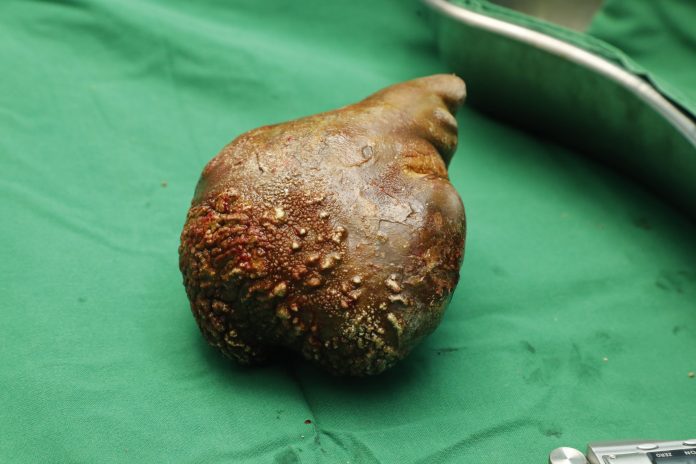A colossal kidney stone, removed from 62-year-old retired soldier Canistus Coonghe (Sri Lanka), has broken two world records.
Measuring 13.37 cm (5.26 in) in length and 10.55 cm (4.15 in) in width, it is the world’s largest kidney stone ever recorded.
The stone was in fact larger than Coonghe’s actual kidney, which has a bipolar length of 11.8cm (4.6 in).
The previous record had not been surpassed since 2004, when a 13 cm (5.11 in) kidney stone was surgically removed from an Indian man named Vilas Ghuge.
Largest kidney stone

Coonghe’s kidney stone is also the world’s heaviest kidney stone, weighing 800 g (1.76 lb). That’s roughly the same weight as five baseballs!
The previous record was 620 g (1.36 lb), set by Wazir Muhammad (Pakistan) in 2008.
Coonghe’s record-breaking kidney stone was in his right kidney and was identified by the urological team at Army Hospital, Colombo, Sri Lanka.
Coonghe underwent a procedure called open pyelolithotomy, whereby the stone was surgically removed through an incision made in the pelvis of his kidney. The operation was performed by Dr Kugadas Sutharshan on 1 June.
Fortunately, despite the blockage, Coonghe’s kidney was still functioning normally, according to the doctors.
His liver, gallbladder, pancreas and spleen were described by Dr Sutharshan as “normal” in size, although Coonghe’s prostate was enlarged.
He is now reportedly recovering well.
Largest kidney stone removed

Kidney stones are formed when highly concentrated urine passes through the kidneys, which can cause chemicals dissolved in the urine to crystallize, forming one or more stones.
Usually, they are the size of a small pebble, however, as you’ve now seen, they can come in much bigger sizes.
Kidney stones can cause acute pain, and although smaller ones can be passed through urination, larger ones require surgery to be removed.


